By Iommie Chiwalo
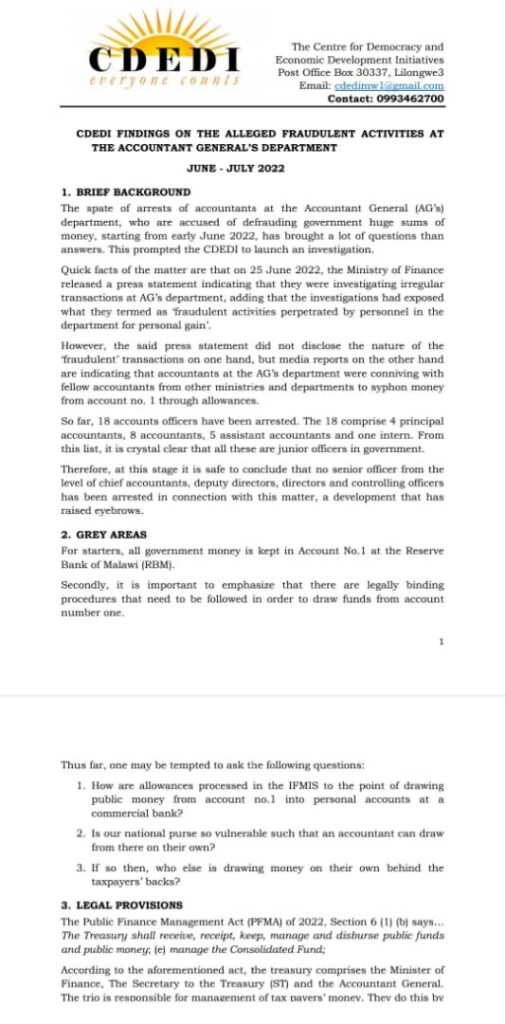
The bypassing of seven watertight steps to cash in account number one irks Centre for Democracy and Economic Development Initiatives (CDEDI) with a call for Finance Minister Sosten Gwengwe to act with speed.
CDEDI has since asked for no further arrests until the Minister of Finance releases allowances data for every public officer beginning from senior most, including cabinet ministers to the junior officers.
In its investigations, CDEDI discovered that government has a rigorous payment process comprising seven layers, the final one being the compliance unit.
“It is against this background that the CDEDI refuses to believe that a watertight process as this one, can be manipulated in favour of junior staff only,” reads the statement on its key findings section.
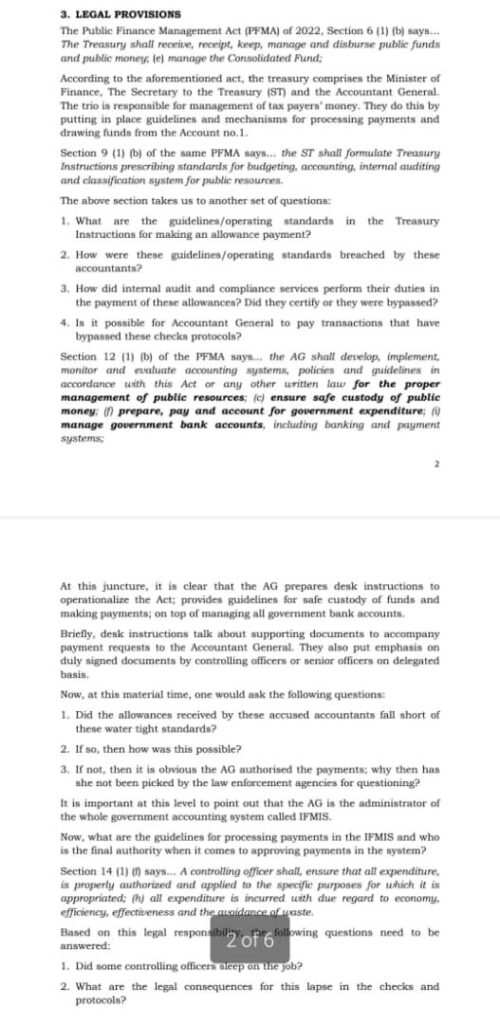
Warranting the demand for the arrest of “big fishes” is the fact that, according to CDEDI investigations, all the junior officers that have been arrested so far, only deal with encrypted data that cannot be tampered with, otherwise the IFIMS system declines to load any data that has been tampered with.
“The arrests were reportedly targeting supper users of the new IFIMIS who underwent training in South Africa, as Trainer of Trainers (ToTs), where they accumulated legitimate allowances, and they were tasked to train others back home,” reads the findings section endorsed by CDEDI Executive Director, Sylvester Namiwa.
The document reveals that the allowances scandal is reported to have started with the accumulation of payment vouchers at the AG’s front office, which is manned by an officer by the name of Eston Sani, who allegedly accumulated huge sums of money in allowances from almost all the departments and agencies as a token of appreciation for handling the payment vouchers that accumulated in July and August 2021.
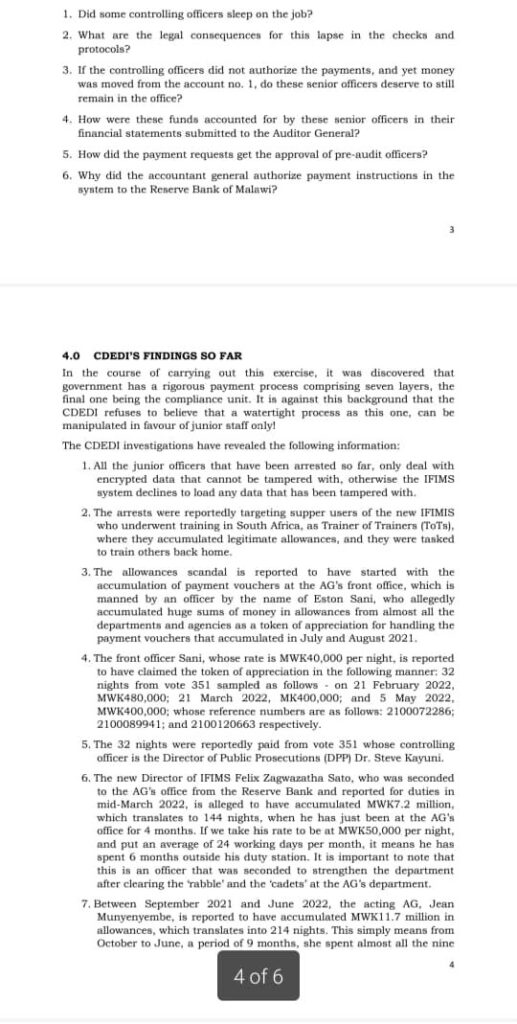
“The front officer Sani, whose rate is MK40,000 per night, is reported to have claimed the token of appreciation in the following manner: 32 nights from vote 351 sampled as follows – on 21 February 2022, MWK480,000; 21 March 2022, MK400,000; and 5 May 2022,MWK400,000; whose reference numbers are as follows: 2100072286; 2100089941; and 2100120663 respectively,” reads the document.
Adding that the 32 nights were reportedly paid from vote 351 whose controlling officer is the Director of Public Prosecutions (DPP) Dr. Steve Kayuni.
CDEDI further reveals that t new Director of IFIMS Felix Zagwazatha Sato, who was seconded to the AG’s office from the Reserve Bank and reported for duties in mid-March 2022, is alleged to have accumulated MWK7.2 million, which translates to 144 nights, when he has just been at the AG’s office for 4 months.
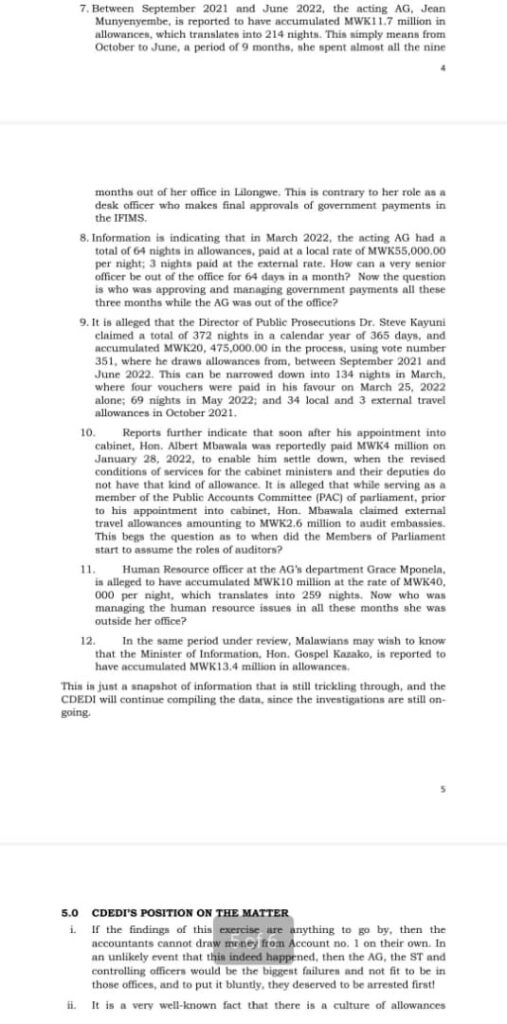
“If we take his rate to be at MWK50,000 per night, and put an average of 24 working days per month, it means he has spent 6 months outside his duty station. It is important to note that this is an officer that was seconded to strengthen the department after clearing the ‘rabble’ and the ‘cadets’ at the AG’s department,” reads the document.
Further revealing that between September 2021 and June 2022, the acting AG, Jean Munyenyembe, is reported to have accumulated MWK11.7 million in allowances, which translates into 214 nights. This simply means from October to June, a period of 9 months, she spent almost all the nine.
“Therefore, CDEDI demands that fiscal police should immediately arrest all controlling officers who approved all dubious accumulated and unjustified allowances that led to the recent spate of arrests and that the ST and the AG should publicly defend their competence in safeguarding public funds, or they should honourably resign before being forced to do so. They should resign from their positions on grounds of incompetence and criminal negligence.
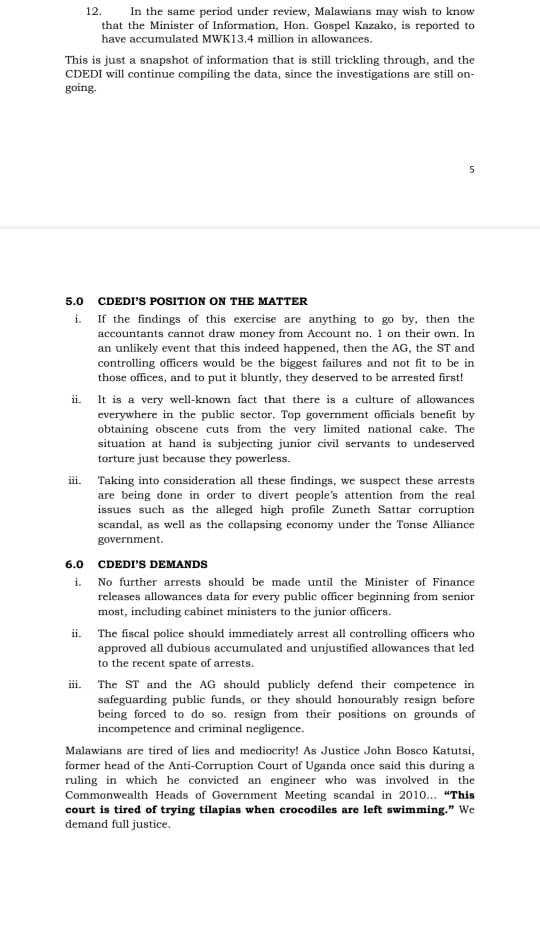
Malawians are tired of lies and mediocrity! As Justice John Bosco Katutsi, former head of the Anti-Corruption Court of Uganda once said this during a ruling in which he convicted an engineer who was involved in the Commonwealth Heads of Government Meeting scandal in 2010… “
This court is tired of trying tilapias when crocodiles are left swimming.” We demand full justice,” reads the statement.
The Public Finance Management Act (PFMA) of 2022, Section 6 (1) (b) says…
The Treasury shall receive, receipt, keep, manage and disburse public funds and public money; (e) manage the Consolidated Fund;
According to the aforementioned act, the treasury comprises the Minister of Finance, The Secretary to the Treasury (ST) and the Accountant General. The trio is responsible for management of tax payers’ money. They do this by putting in place guidelines and mechanisms for processing payments and drawing funds from the Account no.1. Section 9 (1) (b) of the same PFMA says… the ST shall formulate Treasury Instructions prescribing standards for budgeting, accounting, internal auditing and classification system for resources.



